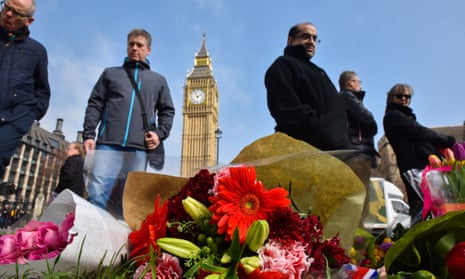When the woman killed by a car on Westminster bridge on Wednesday was named in the media, I recognised her name immediately. I didn’t know Aysha Frade, but I have lots of emails from her. “Study leave and end of term dates,” reads one header. “Parents’ evening reminder, M-Z,” says another. She was the college administrator at my son’s school. She was murdered while walking over the bridge to collect her two children from school.
It’s surprised me, the level of paralysis I feel at this mundane and whisper-light graze of personal connection. It turned me from avid follower of every developing detail to a woman who’d rather not think about it – which is not a luxury those who knew and loved Aysha, or any of the other victims, can afford. All I can really say is that an actual link, no matter how slender and peripheral, has made the sad futility of such violence feel overwhelming to me. That’s uncomfortable too. It feels self-dramatising. Horribly inappropriate. Yet there, all the same.
There are always, in the immediate aftermath of terror events, reactions that can seem narcissistic. The odds, since narcissism is far from uncommon, say that some really are. People who feel the need to take pictures of the dead and dying, then post them on social media. You have to hope that shock is making them behave in that dreadful way. Or the man who was pictured taking a selfie at the scene, snapped by someone able briefly to staunch their own, much healthier reaction in order to shame this other, lesser being: personal reactions to personal reactions to personal reactions, all in a stew of horror and confusion that has to be negotiated.
Some people revert to business-as-usual all too quickly, as do pundits eager to insert themselves into the commentary, to peddle their own obsessive I-told-you-so agenda. Donald Trump Jnr’s attack on Sadiq Khan, the London mayor, because he dared state the obvious – that preparation for terror attacks is small part of the complexity of urban life – seemed particularly obnoxious. Although that view may be a symptom of my own obsessive I-told-you-so agenda. It’s hard to know. Only saints are not susceptible to confirmation bias.
But most people, a lot of the time, are just trying to reverse-engineer their feeling of personal involvement to try to make sense of the visceral shock. At heart, all these responses say one thing: “This got to me.” Sometimes the acknowledgement is clumsy: “I was on Westminster bridge two weeks ago.” Sometimes, it’s mildly self-aggrandising, in a positive way: “We are not afraid.” Sometimes people just need to remind themselves that they are loved and cared for and alive. “Mum. Don’t worry. I’m OK. Here in Enfield.”
It’s often said that a terrorist attack is an attack on all of us. This is certainly the intent. For the vast majority, the attack is psychological – feeling shocked, say – though no less real for that. Random people are used as weapons in such psychological attacks. They are killed and maimed for no reason personal to them at all. They are killed and maimed to inculcate in the rest of us a feeling that we could be next.
My guess is that the closer this feeling creeps, the stronger the psychological attack. The whole world understands this, on some level. It’s where the “solidarity with London” gestures come from. That’s what those lit-up iconic buildings acknowledge: that an attack on a city, or a country, or a college administrator, is an attack on everyone. In that sense, the emphasis is almost removed from the particular victims, in favour of a declaration that in some way everyone is hurt.
The more pragmatic among us warn that making all this fuss just encourages terrorism. Denying perpetrators and their allies the oxygen of publicity: that would be the thing to do. This insistence that we are all targets, that we are all brave and stalwart in the face of attack – it just gives the perpetrators the feelings of war and division that they crave.
Usually an attacker selects a location that represents something they don’t like – the government or communal fun, most often. Their “messages” are generally crude enough to be meaningless, except in their abject declaration of absolute intellectual failure. On that level, these attacks, in their indiscriminate savagery, are hard to take seriously. Except that people are murdered and injured – people like us.
Terrorists think they win, as they love death. But in loving death, they lose. They dehumanise themselves. We deny them the victory of our fear because they don’t deserve it. We mourn their victims because we are still human.
I wish that Aysha Frade had lived long enough for me to have gradually forgotten that she ever existed. I’ll never forget her now.










